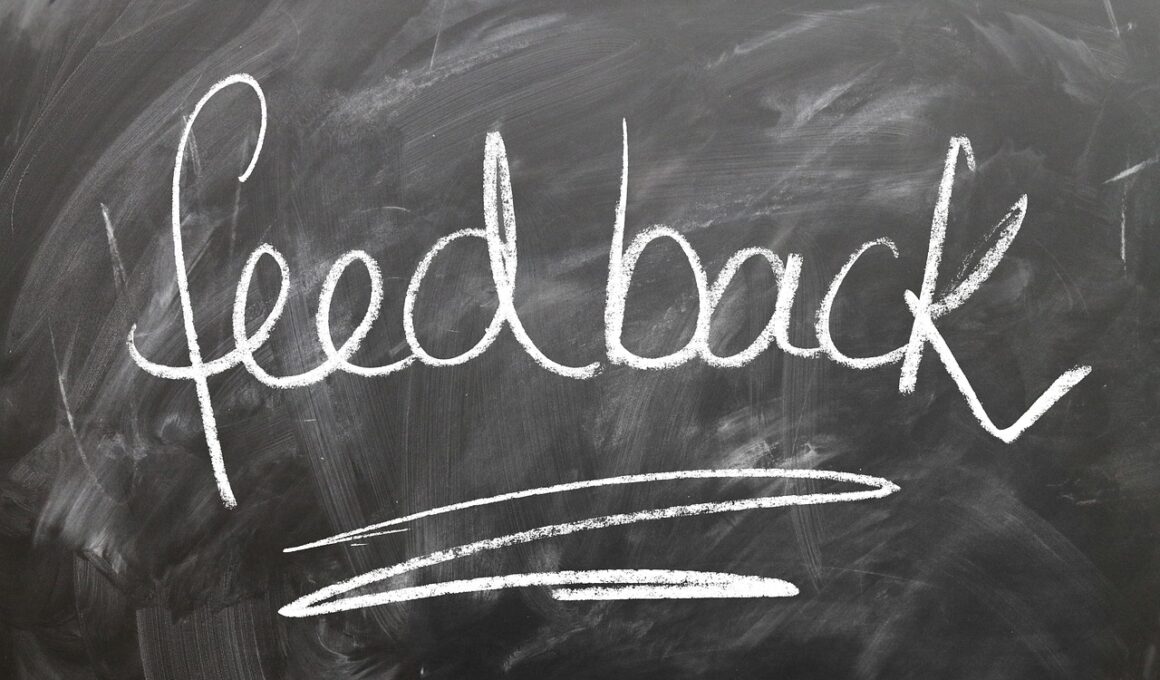How to Respond to Feedback with a Growth Mindset in the Gym
Receiving feedback in the gym is essential for personal improvement. It allows you to reflect on your behaviors and make necessary adjustments. Recognizing that feedback is a tool for growth can significantly enhance your gym experience. When others offer insights into your workout habits, it’s vital to adopt an open mindset. Eyes open wide, listen carefully, and assess the validity of the feedback you receive. Instead of reacting defensively, embrace the opportunity to learn. This applies to all feedback, whether it’s about your technique or personal space usage. Constructive criticism should be viewed as a chance to grow, not an attack, transforming your perspective on advice. Hence, this growth mindset will help develop positive relationships with fellow gym-goers, encouraging collaboration rather than competition. When feedback is given, actively engage with the person providing it. Ask clarifying questions on how you can improve, and express gratitude for their insights. This engagement not only demonstrates respect but also cultivates a supportive environment that enriches everyone’s gym experience, especially yours.
To effectively incorporate feedback into your routine, regularly evaluate your performance. Utilizing a training journal can significantly aid this process. By recording workouts, noting specific feedback, and tracking progress, you create a clear path for improvement. This tool provides insight into patterns and areas that could benefit from change, reinforcing the message embedded in your feedback. Focus on setting achievable short-term goals based on the feedback received. For instance, if a fellow gym member mentions your form during squats, aim to improve your form in a set time frame. Celebrate these small victories along the way, as achieving them fosters motivation. Keep in mind that all feedback isn’t perfect; it’s crucial to discern which comments serve your growth and which may not align with your goals. Always ask yourself how relevant feedback is to your personal fitness journey. Prioritize insights that align with your objectives and adapt them to suit your individual needs. Tracking progress and celebrating achievements builds your confidence and fortifies your commitment to continuous growth in the gym, ensuring you remain on track.
Managing Emotional Responses to Feedback
Receiving feedback can evoke a myriad of emotions, including defensiveness or frustration. It’s important to acknowledge these feelings and process them constructively. Allow yourself a moment to breathe deeply before reacting. This pause can be invaluable, providing the space needed to absorb the feedback without an emotional response clouding your judgment. Practice self-reflection—ask, “What triggered my emotional reaction?” Understanding the underlying reasons can offer improvements to your response mechanism over time. Establishing a strategy for managing emotional reactions when faced with criticism can be beneficial. For instance, remind yourself of your growth mindset; consider previous instances of feedback that led to real progress. Maintaining perspective on your overall fitness journey is helpful. Instead of focusing solely on the present feedback, remember your long-term objectives and how this feedback fits into your journey. This broader view can also minimize the sting of uncomfortable comments. Being aware and practicing emotional regulation can lead to healthier interactions in the gym environment. Create open lines of communication with others, allowing discussions on feedback to be transparent and constructive.
Building a supportive network in your gym can greatly enhance how you handle feedback. Form relationships with fellow gym-goers who exemplify a positive attitude towards personal growth. Seek people who are not only constructive with their criticism but also encouraging and uplifting. Surrounding yourself with positive influences can motivate you to accept and act on feedback more readily. Engaging in group workouts or classes can establish bonds and create an atmosphere where feedback flows freely. Be proactive in offering your feedback to others, establishing a mutual understanding that everyone is striving for improvement. When you provide feedback, aim to do so with kindness and respect, understanding others may also experience defensiveness. This reciprocity fosters a culture of acceptance and growth, cultivating an environment where feedback is welcomed and followed up with personal action. Those in your fitness circle can serve as accountability partners. When faced with challenges, remember your support network and seek assistance from them. They may provide insights you hadn’t considered and help reinforce your motivation to continue developing in the gym.
Reflecting on Received Feedback
After adopting feedback, it’s essential to reflect on your journey regularly. Periodically assess the changes you’ve implemented based on insights from others, noting what has worked and what can be further improved. By dedicating time to reflection, you gain insight into the implementation process. Employ techniques like journaling or using visual tools like charts for tracking performance over time. This can enhance your understanding of your progress concerning the feedback you received. Additionally, seeking periodic follow-ups from those who provided feedback initially helps maintain an open line of communication. Ask them how they perceive your progress, valuing their insights while also affirming your willingness to learn. Engaging them in conversation reinforces the importance of the feedback and your commitment to personal growth. Through this consistent reflection, you’ll solidify a culture of learning within your gym interactions. Always stay committed to personal growth and advocate for your own journey. With every piece of constructive criticism, embrace the advancement it offers, steering your fitness path in a direction aligned with your aspirations.
Incorporating feedback into your habits goes beyond physical improvements; it involves fostering a respectful gym culture. When everyone embraces the growth mindset, the atmosphere becomes more supportive and motivational. Therefore, addressing behaviors that may hinder others’ experiences becomes crucial, particularly concerning personal space or equipment sharing. If friends or peers suggest improvements in your actions, take these comments seriously. This not only enhances your workout routines but contributes to the greater community. Strive to create an atmosphere where everyone feels heard and valued. Opening yourself to feedback and acting on it models ideal behavior for others, influencing them positively. When feedback is framed in a constructive manner, it encourages accountability among peers. Engaging with your fitness community enables relationships built on mutual respect and trust. Plus, when members make adjustments to their behaviors, the overall gym experience improves. Hence, grasping how feedback plays into community well-being is vital and not merely personal development. Ensuring that everyone feels their voice matters creates a safe environment cultivating long-term fitness success for all involved.
Continuous Growth and Learning
Lastly, create a mindset that embraces continuous learning beyond feedback sessions. Frequently commit to seeking additional information, whether through workshops, personal training sessions, or literature related to fitness and nutrition. Embrace the idea that the gym is a learning environment, and every session is an opportunity for edification. Engage with reputable sources to gain fresh insights into effective techniques and strategies. Each new piece of knowledge can offer potential pathways towards enhancing your overall experience. Share these discoveries with your gym community, encouraging collaborative learning, and reinforcing your growth mindset. Building a culture of knowledge-sharing fosters engagement and positions you as an advocate for growth among your peers. Organize informal discussions, workshops, or group challenges centered on collective learning. Invite trainers or experienced members for demonstrations that emphasize feedback and corrections. As you continue to grow, ensure that your fitness journey remains dynamic, adjusting to the latest best practices while encouraging others to join. Remember, every individual contributes to the gym’s ecosystem, promoting a supportive and enriching environment for all to thrive.
To complete your journey, reflect on what you’ve learned from both giving and receiving feedback, establishing guidelines for future interactions. By incorporating these strategies into your routine, you create a more positive and constructive gym culture for yourself and those around you, ensuring your growth mindset continues to thrive.


